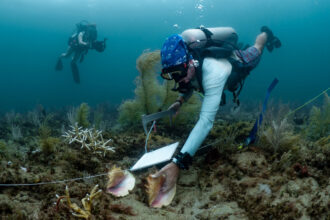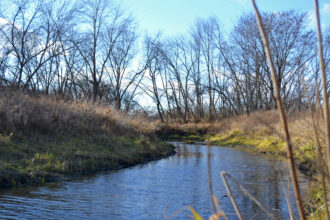Louisiana Gov. John Bel Edwards on Friday vetoed a bill that would have stiffened penalties for trespassing on pipelines, levees and a long list of other facilities in the state. The veto handed a victory to civil liberties advocates and local organizers, who said the bill would have trampled on their right to protest industrial development.
The legislation would have imposed a mandatory minimum three-year sentence for stepping onto “critical infrastructure” during a state of emergency and expanded the list of what falls under that definition, to include flood control structures, which criss-cross the state.
Advocates said the bill would have extended the reach of an already vague law that imposes harsh penalties for trespassing on oil and gas industry land and other sites. They argued that the law would intimidate activists who have fought pipelines and chemical plants across the state, by threatening prison sentences for minor infractions. In St. James Parish, west of New Orleans, residents who have been fighting a planned petrochemical complex had regularly stepped onto a levee adjacent to the site, an action that could have qualified as a felony punishable by a minimum sentence had the law gone into effect.
“I’m filled with joy,” said Sharon Lavigne, a St. James resident who has led the opposition to the chemical plant, saying she felt like a weight had been lifted off her chest.
The bill’s author, Rep. Jerome Zeringue, a Republican, said he introduced the bill on behalf of the Association of Levee Boards of Louisiana, and that he did not speak with any energy or chemical companies about the legislation. But the bill did draw support from Robert Baumann, a lobbyist who represents oil and gas and pipeline companies. Baumann did not immediately respond to a request for comment.
In a statement, Edwards, a Democrat, said he supported the intent to protect water control structures, but that the bill’s wording would have included levees used for recreation. He also said that because Louisiana “is in a constant state of emergency, there would likely never be a time when the lesser penalty is in effect.”
Under current law, trespassing on critical infrastructure carries a sentence of up to five years in prison.
The bill had passed with enough votes in both houses of the State Legislature to override the governor’s veto, a chance lawmakers will have later this year. Zeringue said that while he would consider an override, “I feel it would be better for everyone if we just clarify” the bill next session.
Last year, Lavigne and other activists discovered that the company behind the planned petrochemical plant, Formosa Plastics, had learned of a burial site on the property that may contain the remains of slaves. Lavigne’s family has been in St. James for as long as she knows, and she considers the people buried there to be her ancestors, so she and others in her group had been visiting the site to lay flowers until Formosa told her she was trespassing. Because a pipeline happens to run under the area, the site could be considered critical infrastructure under state law.
Lavigne and her organization, RISE St. James, are planning to hold a ceremony at the burial site to celebrate Juneteenth, the holiday on June 19 that commemorates the end of slavery. Their lawyer sent a letter to Formosa’s lawyer asking for access. They have not gotten a response yet.
“We still have plans to go out there,” Lavigne said. “Because it’s our right to visit the gravesite that just happens to be on their property.”
About This Story
Perhaps you noticed: This story, like all the news we publish, is free to read. That’s because Inside Climate News is a 501c3 nonprofit organization. We do not charge a subscription fee, lock our news behind a paywall, or clutter our website with ads. We make our news on climate and the environment freely available to you and anyone who wants it.
That’s not all. We also share our news for free with scores of other media organizations around the country. Many of them can’t afford to do environmental journalism of their own. We’ve built bureaus from coast to coast to report local stories, collaborate with local newsrooms and co-publish articles so that this vital work is shared as widely as possible.
Two of us launched ICN in 2007. Six years later we earned a Pulitzer Prize for National Reporting, and now we run the oldest and largest dedicated climate newsroom in the nation. We tell the story in all its complexity. We hold polluters accountable. We expose environmental injustice. We debunk misinformation. We scrutinize solutions and inspire action.
Donations from readers like you fund every aspect of what we do. If you don’t already, will you support our ongoing work, our reporting on the biggest crisis facing our planet, and help us reach even more readers in more places?
Please take a moment to make a tax-deductible donation. Every one of them makes a difference.
Thank you,














